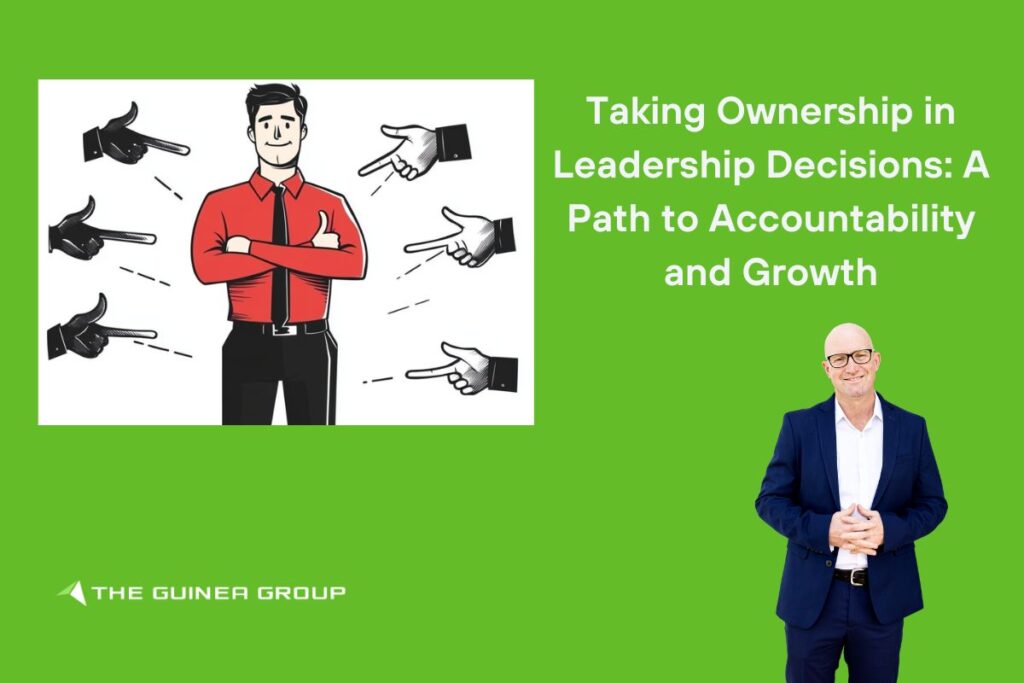Anton Guinea
Entrepreneur, Speaker, bestselling author, and founder of The Guinea Group of Companies. For over 15 years, Anton has helped leaders move their teams to become psychologically safe, physically safe and overall better versions of themselves.

Taking Ownership in Leadership Decisions: A Path to Accountability and Growth

Leadership means not just making decisions but fully owning them. I’ve learned this firsthand through both successes and failures in my journey as a leadership coach, speaker, and trainer. I remember a moment early in my career when I made a decision that didn’t pan out as expected. The temptation to deflect responsibility was there, but I chose to own up to it, learn from it, and move forward.
That experience taught me that true leadership is tested when challenges arise, mistakes happen, or unexpected outcomes unfold. Taking ownership fosters trust, credibility, and long-term success.
Three Ways to Take Full Ownership of Leadership Decisions
1. Accept Responsibility Without Excuses
Taking ownership starts with accepting responsibility for decisions—good or bad. A leader who owns their choices, rather than blaming external factors or team members, builds a culture of trust and accountability. I recall a time when I launched a new leadership workshop that didn’t resonate with my audience as expected. Instead of blaming external circumstances, I reevaluated the content, sought feedback, and refined the approach. That decision not only improved the program but also strengthened my credibility.
A study published in PLOS ONE found that leaders who take responsibility for their decisions inspire greater engagement from their teams. The research emphasised that when leaders acknowledge their missteps and actively work toward solutions, employees are more likely to follow suit, creating a culture of continuous learning and improvement.
How to Apply This:
- Acknowledge mistakes openly. If a decision doesn’t go as planned, communicate transparently with your team about what happened and what can be improved.
- Avoid blame-shifting. Instead of pointing fingers, focus on what you can control and how you can adapt.
- Model accountability. When leaders own their actions, it encourages team members to do the same, fostering a culture of honesty and responsibility.
2. Make Decisions with Confidence and Learn from Outcomes
Ownership is about making decisions with confidence and embracing the results. I once worked with a leader who hesitated to make bold decisions, fearing failure. After coaching, they shifted their mindset to see every decision as a learning opportunity. Eventually, they became more decisive, and their team responded with increased trust and alignment.
A study from the Journal of Applied Psychology found that leaders who make firm decisions and learn from both successes and failures build stronger team morale and performance. The research showed that employees respect leaders who take a stance, even if adjustments are needed later, rather than those who waver in uncertainty.
How to Apply This:
- Commit to decisions. Even when uncertain, make the best decision possible with the information available.
- Reflect on outcomes. After each major decision, analyse what worked and what didn’t, using it as a growth opportunity.
- Encourage team input. Ownership doesn’t mean making decisions in isolation—engage your team in the process to strengthen collaboration and buy-in.
3. Lead by Example to Foster Ownership in Others
Leaders who take ownership set the tone for their teams. If you demonstrate accountability in your decisions, your team will follow. I once consulted a company struggling with low engagement. The issue? Leaders weren’t modeling accountability, so employees hesitated to take initiative. Once leadership began practicing ownership the team culture shifted dramatically.
A recent article titled “Five Leadership Behaviours That Build Accountability and Drive Success” discusses how leaders who consistently demonstrate accountability create a ripple effect within their organisations. The article highlights that organisations with high leadership accountability tend to be healthier and more successful.
How to Apply This:
- Be the first to own challenges. When setbacks happen, address them head-on rather than waiting for others to take responsibility.
- Recognise and reward accountability. Acknowledge team members who take ownership of their work and decisions.
- Create a safe space for ownership. Encourage an environment where employees feel comfortable owning their decisions without fear of harsh consequences.
Conclusion
Taking ownership in leadership means building trust, learning from experiences, and setting an example for others. By accepting responsibility, making confident decisions, and leading by example, you cultivate a culture of accountability that drives long-term success.
What’s one leadership decision you’ve taken ownership of recently? Share your experiences—I’d love to hear your thoughts!
Please click the image below if you’d like to chat about what leadership means to you

If you would like to learn more about Anton or The Guinea Group, please click here to book into Anton’s calendar, to:
UPGRADE your Mindset
UPSKILL your Leadership
UPLIFT your Teams
About Anton
Anton has dedicated his working life to helping leaders to upgrade their mindset, upskill their leadership, and uplift their teams! With a focus on helps leaders to better lead under pressure. Anton is an entrepreneur, speaker, consultant, bestselling author and founder of The Guinea Group. Over the past 19 years, Anton has worked with over 175+ global organisations, he has inspired workplace leadership, safety, and cultural change. He’s achieved this by combining his corporate expertise, education (Bachelor of HR and Psychology), and infectious energy levels.
Work With Anton!
Subscribe to our Newsletter